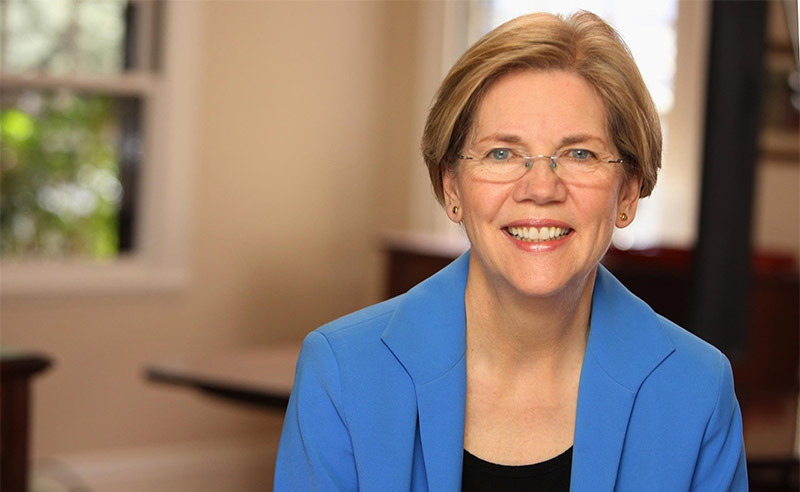Massachusetts Senator Elizabeth Warren turned a critical eye to Silicon Valley in a keynote speech delivered at New America's Open Markets Program on Wednesday, saying industry leaders Apple, Amazon and Google use their respective platforms to the detriment of smaller, less powerful competitors.
Falling just shy of accusing the tech giants of running a monopoly, Sen. Warren's (D-Mass.) remarks are in stark contrast to those presumptive Democratic presidential nominee Hillary Clinton made in laying out her technology agenda on Tuesday, a plan viewed as chummy to Silicon Valley. Warren was invited on stage at yesterday's event, prompting speculation that she might join Clinton on the Democratic ticket.
At the Open Markets Program, Warren cautioned against "consolidation and concentration" of power in the tech sector, reports Re/code. The senator wagged a finger at industry heavyweights Apple, Amazon and Google for leveraging their respective platforms to effectively "lock out smaller guys and newer guys."
"Google, Apple and Amazon have created disruptive technologies that changed the world, and [...] they deserve to be highly profitable and successful," Warren said. "But the opportunity to compete must remain open for new entrants and smaller competitors that want their chance to change the world again."
As it applies to Apple, Warren took issue with the company's strict control over its various App Stores, saying sales regulations make it difficult for third-party streaming services to compete against products like Apple Music. The issue has been raised before by firms marketing music streaming services, which in 2015 branded Apple's App Store policies as anti-competitive.
Apple takes a customary 30 percent cut of all purchases made through the iOS and Mac App Stores, including in-app transactions, meaning companies like Spotify must charge users an extra fee to break even. Spotify's premium $10 subscription tier, for example, sells for $13 on iOS and Apple does not allow linking to external stores. In response, Spotify last year encouraged customers to save money by bypassing the App Store and signing up online.
To its credit, Apple is planning to loosen restrictions when a new revenue sharing model rolls out this fall. Instead of charging 30 percent across the board, the company will reduce its take to 15 percent for customers who hold subscriptions for more than one year. The idea is to drive sustainable income instead of one-time app buy-ins. Spotify says the changes are not enough.
The streaming music company also took the opportunity to chime in on Warren's comments.
"Apple has long used its control of iOS to squash competition in music, driving up the prices of its competitors, inappropriately forbidding us from telling our customers about lower prices, and giving itself unfair advantages across its platform through everything from the lock screen to Siri," said Jonathan Prince, Global Head of Communications and Public Policy at Spotify. "You know there's something wrong when Apple makes more off a Spotify subscription than it does off an Apple Music subscription and doesn't share any of that with the music industry. They want to have their cake and eat everyone else's too."
In her speech today, Warren knocked Google for "its dominant search engine to harm rivals of its Google Plus user review feature," while claiming Amazon "uses its position as the dominant bookseller to steer consumers to books published by Amazon to the detriment of other publishers."
The senator from Massachusetts is famously opposed to the consolidation of power by the few, hence her appearance at today's conference (incidentally, the meeting was titled "America's Monopoly Problem What Should the Next President Do About It?"). Warren's zeal for healthy competition extends far beyond the technology sector, though recent media coverage has focused on her interest in Silicon Valley's elite.
 Mikey Campbell
Mikey Campbell






-m.jpg)






 Charles Martin
Charles Martin


 Wesley Hilliard
Wesley Hilliard
 Stephen Silver
Stephen Silver
 William Gallagher
William Gallagher

 Marko Zivkovic
Marko Zivkovic









87 Comments
Fauxcahontus can rant all she wants, the reality is she's an unsuccessful hack with no concept of the reality of business. Which explains why she was in academia and moved to government.
this maybe true, but is it really unique to Apple?
There is always a level of barrier to entry.
To compete, you need to overcome that barrier.
It's difficult to build successful platforms, so nobody is going to lay down the red carpet for you to just walk-in and compete.
Boo fucking boo. It's Apples store and they can run it how they like. Walmart doesn't have to allow anyone sell their products in their store so why should Apple?